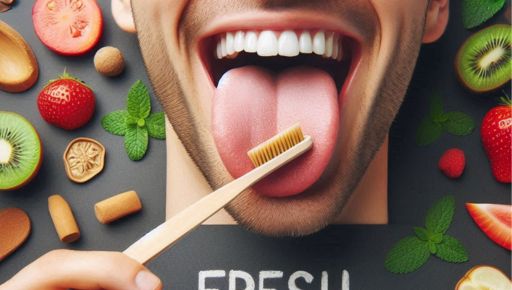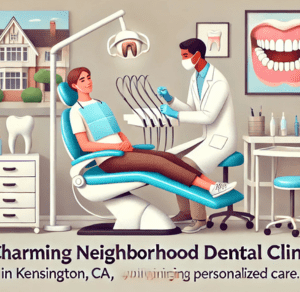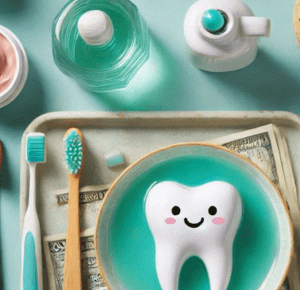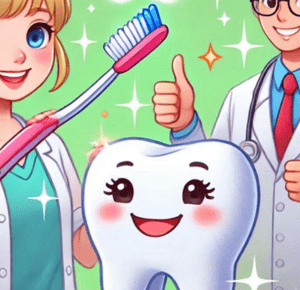
At our dental clinic Wantagh, NY, we emphasize the importance of comprehensive oral care, including often-overlooked practices like tongue scraping. This simple yet powerful technique can significantly impact oral health, reducing bad breath, preventing gum disease, and boosting overall well-being. By removing bacteria, debris, and mucus from the tongue’s surface, tongue scraping helps maintain a healthy oral environment. Our experienced dentists and hygienists recommend incorporating tongue scraping into daily routines to enhance the effectiveness of regular brushing and flossing.
What is Tongue Scraping?
Tongue scraping involves using a specialized tool, typically made of stainless steel, copper, or plastic, to gently remove bacteria, debris, and mucus from the tongue’s surface. This process helps to:
- Reduce bacteria and volatile sulfur compounds (VSCs) that contribute to bad breath.
- Prevent the buildup of toxins and heavy metals.
- Improve taste and digestion.
- Enhance oral hygiene.
Exploring The Potential Benefits of Regular Tongue Scraping
Regular tongue scraping has been linked to numerous oral health benefits, extending beyond the mouth to overall well-being. Some potential advantages include:
Oral Health Benefits
- Reduced Bad Breath: Removing bacteria and volatile sulfur compounds (VSCs) eliminates halitosis.
- Improved Gum Health: Tongue scraping reduces plaque, gum inflammation, and risk of gum disease.
- Enhanced Taste: Removing bacteria and debris improves taste bud function.
- Fresh Breath: Regular scraping promotes a cleaner, fresher mouth.
Systemic Health Benefits
- Boosted Immune System: Removing toxins and heavy metals supports overall immune function.
- Reduced Inflammation: Tongue scraping may help alleviate systemic inflammation.
- Improved Digestion: Enhanced taste and oral health may aid digestion.
Additional Benefits
- Increased Energy: Removing toxins can increase energy levels.
- Improved Mental Clarity: Reduced toxins and inflammation may enhance cognitive function.
- Better Oral Hygiene: Tongue scraping complements brushing and flossing.
| Studies have shown: Tongue scraping reduces VSCs by 75% (Journal of Clinical Dentistry).Regular scraping decreases gingivitis and plaque (Journal of Periodontology).Tongue scraping improves taste sensitivity (European Journal of Oral Sciences). |
How to Tongue Scrape
Tongue scraping is a simple and effective way to remove bacteria, debris, and mucus from the surface of your tongue. Here’s a step-by-step guide:
Materials Needed
- Tongue scraper (stainless steel, copper, or plastic)
- Water or mouthwash for rinsing
- Optional: antibacterial mouthwash or tongue gel
Step-by-Step Instructions
- Rinse the Scraper: Rinse the tongue scraper with water or mouthwash.
- Position the Scraper: Place the scraper as far back on the tongue as possible, without triggering the gag reflex.
- Scrape Forward: Gently scrape forward, removing bacteria, debris, and mucus from the tongue’s surface.
- Repeat: Repeat steps 2-3 2-3 times, or until the scraper comes away clean.
- Rinse: Rinse the scraper and tongue with water or mouthwash.
- Optional: Apply antibacterial mouthwash or tongue gel to the scraper or tongue for added benefits.
Tips and Precautions
- Be Gentle: Avoid applying too much pressure, which can cause discomfort or bleeding.
- Scrape Morning and Night: For optimal benefits, scrape twice daily.
- Clean the Scraper: Regularly disinfect the scraper to prevent bacterial buildup.
- Avoid Scraping Too Far Back: Stop at the back of the tongue to avoid triggering the gag reflex.
- Replace the Scraper: Replace the Scraper every 3-6 months or as recommended by the manufacturer.
Best Practices
- Scrape before Brushing: Scrape your tongue before brushing your teeth for optimal oral hygiene.
- Use a Tongue Scraper with a Comfortable Handle: Choose a scraper with a comfortable handle for easy use.
- Scrape in Front of a Mirror: Scrape in front of a mirror to ensure proper technique.
Bottom Line
Tongue scraping is a simple yet powerful tool for maintaining optimal oral health. By removing bacteria, debris, and mucus from the tongue’s surface, tongue scraping helps prevent bad breath, gum disease, and other oral health issues. Regular tongue scraping also contributes to overall well-being by reducing inflammation, boosting the immune system, and improving digestion. Incorporating tongue scraping into your daily routine, alongside regular brushing and flossing, can significantly enhance your oral hygiene and overall quality of life.






